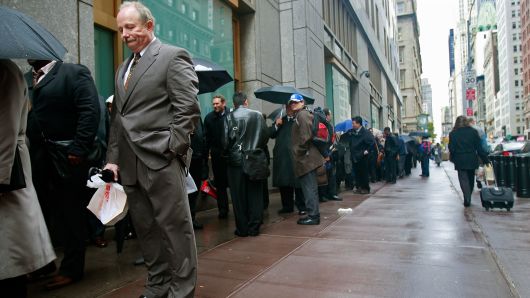
Mario Tama | Getty Images
A man waits on line with other job seekers at the Internal Revenue Service (IRS) Career Open House October 28, 2008 in New York City.
Yet for some folks, the lingering effects of the recession would last much longer.
“I never really bounced back,” said the 44-year-old Clune, who to this day is struggling financially and living in Lima, Peru, with his 9-year-old Labrador dog, Trouble. He has lived in Peruvian capital for about four months and describes it as “somewhere I can afford on the disability check.”
It’s a long way from the days when Clune worked in Sarasota Springs, New York, for an independent mortgage lender that employed about 1,000 people. He sold residential loan products mostly tied to big banks such as Wells Fargo.
“December of 2007, I had finally hit my stride,” Clune said. “I had been working at it a few years and actually made the best in the company that month.”
During this time, risky subprime mortgage lending was popular, especially in super-heated housing markets in the Southwest U.S. and East Coast cities as a way for people with low credit scores who didn’t qualify for lower rates to achieve home ownership. Loose underwriting standards were common, and that meant some mortgages did not have full borrower documentation attached to them.
“Nobody cared about what the paper was back then since everybody was banking on the house continuing to go up in value,” he said. “The continued increase in the value of homes hid a multitude of sins in the lending practices. Then the home values stopped going up.”
Clune remembers getting laid off in the summer of 2008 from his mortgage broker job along with hundreds of others in the office and thinking the industry would bounce back. He wasn’t alone — others had that view, too.
“There had been lots of regional slumps that people had weathered, and they were generally short-lived,” said Aaron Terrazas, Zillow senior economist and a former economist in the Treasury Department’s Office of Economic Policy. “People had this experience of regional downturns in their minds.”
 EU News Digest Latest News & Updates
EU News Digest Latest News & Updates



